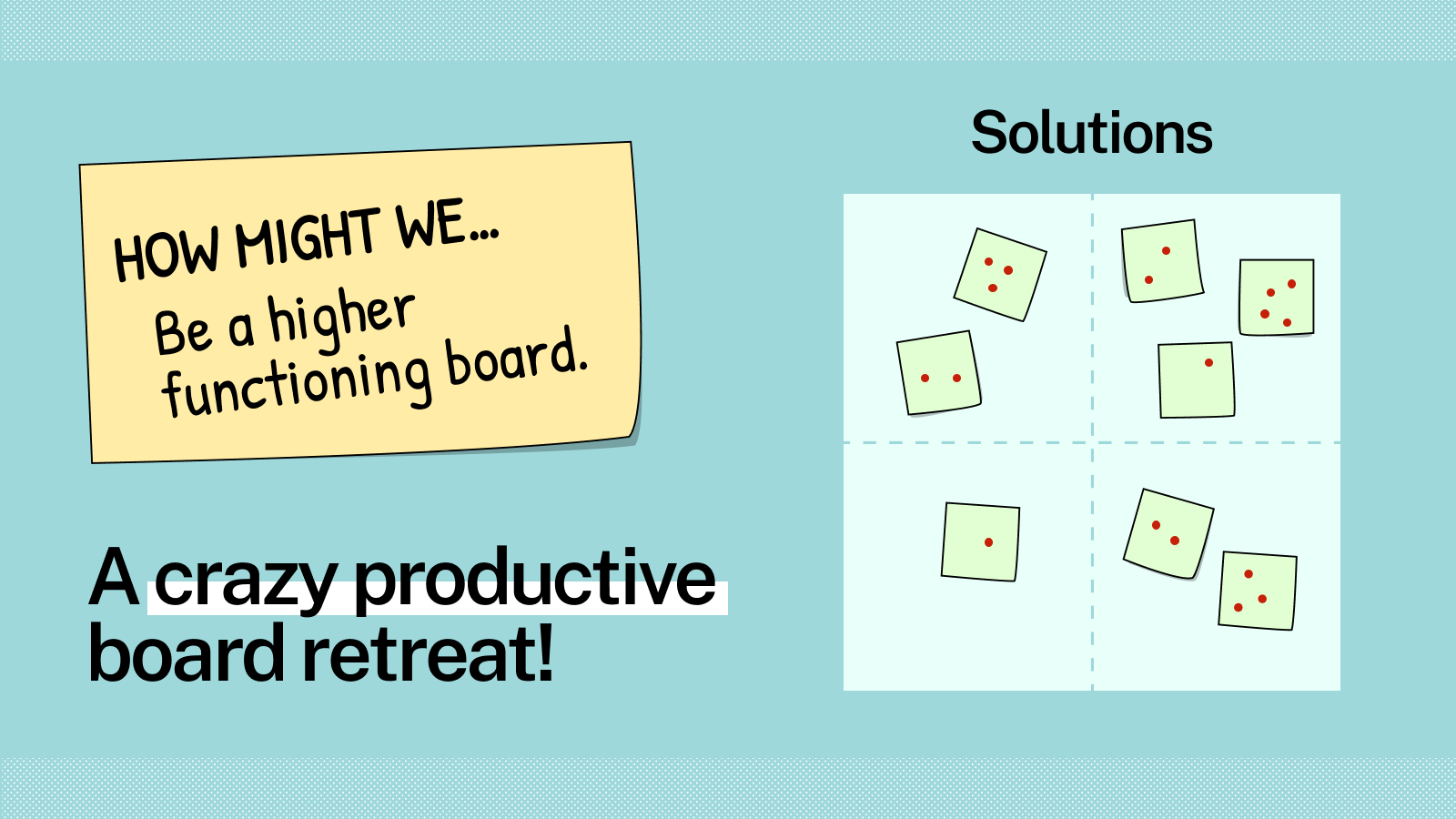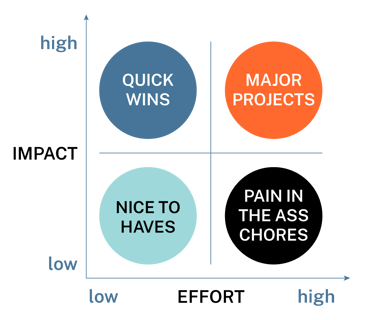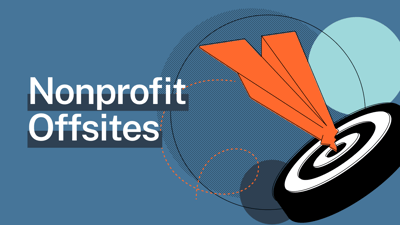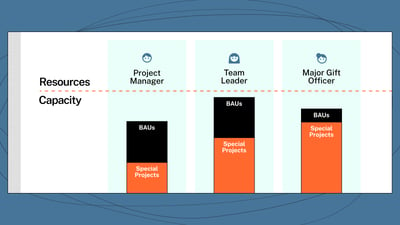Planning an Engaging and Productive Board Retreat for Nonprofits

After we facilitated a one-day nonprofit board retreat, here’s what one attendee shared with us:
"We all enjoyed the retreat immensely. I’ve heard nothing but great things from our board."

In this article, I’ll share what made this board retreat both productive and enjoyable, including engaging icebreakers, a well-defined agenda, and interactive activities so you can have a successful offsite.
Unlike staffs that interact Monday through Friday, boards typically meet no more than once a month and often only once per quarter.
As such, though its members are acquainted, none likely know each other very well.
Thus, start your board retreat with an ice breaker that creates a level of comfort and camaraderie.
Icebreakers: Building Camaraderie from the Start of Your Retreat
Your retreat’s overall tone depends on how it begins. Kickstart your board retreat by creating an atmosphere of comfort and connectedness among your board members. So dump the jokes (like how scientists don’t trust atoms because they make up everything), and opt for something that promotes inclusiveness.
For example, leading a board retreat for animal welfare, we asked attendees to share their favorite pet name.
And for a Boys and Girls Club retreat, we asked which club activity they liked the most.
In all cases, we also encourage each person to express their personal goals and expectations for the day, whether it's strengthening relationships, problem-solving, or assessing the organization's success.
So many desires and so little time!
Crafting a Well-Structured Agenda: Maximizing Engagement and Focus
To keep attendees engaged and focused during the retreat, develop a clear agenda with well-defined objectives. When thoughtfully prepared, you can address key issues, challenges, and areas of improvement.
Start with your organization’s leader giving a presentation—say, on previously agreed-to strategies and their current status.
Keep in mind that nobody wants death by Powerpoint, so limit it to 30 minutes. Afterward, you can move on to your agenda’s primary subject matter, like:
- What are the key issues or challenges the nonprofit is facing?
- What are the areas of improvement?
- How can board members contribute to achieving goals, both immediate and long-term?
During the retreat, provide opportunities for board members to contribute to short-term and long-term goals. By structuring discussions and activities around their desired outcomes, you can meet the attendees' expectations effectively.
Interactive Activities and Team Building: Fostering Cohesion and Commitment
Certainly, you’ll want your board members to actively participate in things like strategy, brainstorming, and decision-making sessions.
But, along with opportunities for networking and informal conversations, a well-designed agenda also includes team-building activities.
They help promote stronger relationships among board members, not to mention a sense of shared purpose and commitment to the organization’s mission.
For example, arrange a panel discussion featuring personal anecdotes, testimonials, or case studies that showcase the positive impact of your nonprofit's programs.
Alternatively, invite inspiring guest speakers to share experiences, insights, and success stories. These activities reignite passion and generate fresh ideas.
Problem-Solving with the "How Might We" Framework
Encourage board members to actively contribute to problem-solving using the "How might we" framework. It begins with attendees writing down organizational challenges, each on its own Post-It note that gets stuck up on a wall.
After review, the top-voted problems get reframed by the facilitator with “How might we…?”
For example, the problem of “Unpredictable donations” may get reframed as, “How might we convert one-time donors into monthly givers?” A solutions process then follows.
In the case of a board retreat, we don’t need votes on what issue to take up. Rather, we specify it: “How might we be a higher performing board?”
Thus, we can get right to the solutions phase of our activity.
Answering the question, attendees write as many Post-It suggestions as they can in, say, 10 minutes. Silent voting by sticky dots ensues, with each person allowed multiple picks.
Top vote-getting suggestions are then positioned in an “Effort/Impact” grid according to shout-outs by attendees.
The sweet spot is “High Impact, Low Effort,”: Turning Quick Wins into Lasting Change

These are generally solutions that can be executed in the immediate future, with their authors recommending specific steps needed to do so.
To me, these actionable quick wins are crucial for becoming “a higher performing board.”
That’s because anything placed in the other quadrants have much less chance of being initiated.
Don’t get me wrong. I’m sure that most members attending infrequently held board meetings make commitments in good faith.
But the reality is that little action is taken between meetings. Members are essentially volunteers that have full-time jobs and, like all of us, deal with other life stuff like family and problems.
So while the best of intentions may be voiced in a board meeting, they may never come to fruition. In short, there’s no real accountability.
That’s what makes your quick wins at a board retreat so important.
They’re rapidly doable, the steps for how to do them are known, and responsibilities and deadlines can be assigned on the spot.
Once one or two quick wins actually occur, your board may just have the appetite for putting more on their plate!
So—you’re ready with ice breaking, a clearly defined agenda, activities that promote cohesiveness and commitment to the cause, and a way to produce viable action items.
The Role of a Skilled Retreat Facilitator
Though almost anyone can lead a board retreat, accomplished facilitators can make a huge difference when it comes to meaningful outcomes.
"CauseMic did a fantastic job facilitating. I loved their energy, exercises, and overall approach."

Using strong communication skills, adept facilitators actively listen, keep the retreat focused, employ empathy and emotional intelligence, stimulate creativity, and readily adapt.
They can help keep discussions on track, manage time effectively, and ensure that everyone's voice has room to be heard.
They’re also able to create a safe and inclusive environment where board members feel comfortable sharing their ideas, opinions, and concerns.
As such, they successfully encourage active participation.
If you want help facilitating your next board retreat, book a free scale session with CauseMic and give us a once-over. When you hire CauseMic to facilitate your offsite, each attendee will get a free copy of The High-Growth Nonprofit: Proven Steps to Quickly Double your Revenue and Drive Impact.
Get your directors out of the bored room, and refresh them with a memorable event!


